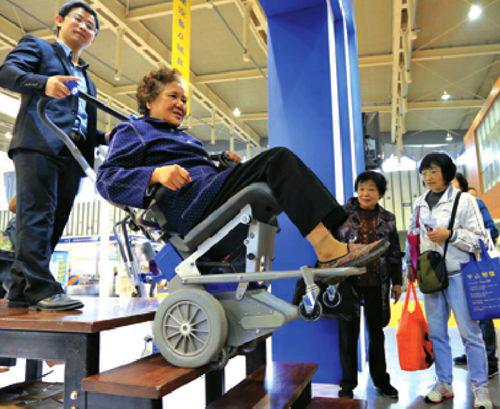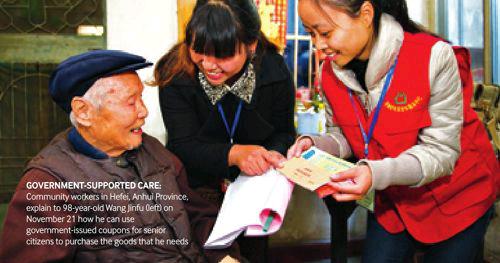Caring for the Elderly
2014-01-28ByTangyuankai
By+Tang+yuankai

Chinas senior population, 60 or older,
reached 200 million in September 2013 and nationwide an average of 24,800 people retire every day, equaling nearly one person every second, said Hu Xiaoyi, Vice Minister of Human Resources and Social Security, at a forum on Chinas ag- ing society in Beijing on November 2.
Driven by sustained increases in average life expectancy, low birth rates and accelerated urbanization, the aging of Chinas population will become even faster in the future. Meanwhile, changing relationships and home duties caused by the family plan- ning policy and population migration on an unprecedented scale mean that many older Chinese can no longer rely on support and care from their children like their parents or grandparents did.
China first introduced its family planning policy in the late 1970s to rein in the surging population, which allowed most urban couples to have only one child while allowing most rural couples to have two if their firstborn was a girl. In late 2011, couples across the country were given the option of having two children if both of the parents are themselves from one-child families. Last December, the Standing Committee of the National Peoples Congress, Chinas top legislature, decided to further relax birth control measures by allowing families to have a second child so long as at least one of the parents is an only child.
According to a report on the elderly issued by the China Research Center on the Aging in February 2013, China would have more than 100 million “empty nesters”—senior citizens in a family without children living close by—by the end of last year. Traditionally in China, children live with their aging parents and take care of them. However, this support model has become unrealistic, as many young couples are both only children and dont have the time or energy to take care of four seniors. Meanwhile, not all young people can afford to provide their parents with income support due to their finances being used up buying increasingly expensive property, education for their children and the highly competitive labor market.
Recent discussions on an aging society in China focus on how to handle the various challenges it has brought upon the country.
At the same forum, Li Wei, Director of the Development Research Center of the State Council, said that it took China only 25 years to reach the same senior citizen balance that took Western countries 100 years. He added that China faces unique challenges as both an aging and a developing society.endprint
